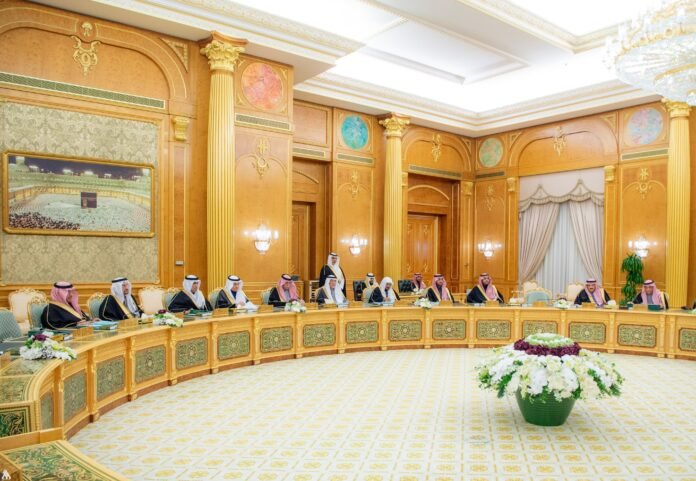In a weekly Cabinet session chaired by Crown Prince Mohammed bin Salman, held in Riyadh on Tuesday, a series of regional and international matters were discussed. Several agreements aimed at strengthening Saudi Arabia’s global partnerships received approval. The session also spotlighted the Kingdom’s ongoing economic diversification and its efforts to enhance international collaboration.
The Crown Prince briefed the ministers on his recent conversations with King Abdullah II of Jordan and UAE President Sheikh Mohammed bin Zayed Al-Nahyan. He emphasized the Kingdom’s strong stance on regional issues, including the Palestinian cause. The Cabinet made it clear that Saudi Arabia rejects any Israeli statements that advocate the displacement of Palestinians. Ministers reaffirmed the Kingdom’s firm commitment to the two-state solution. They asserted that lasting peace in the region can only be achieved through peaceful coexistence and respect for both parties’ rights.
On the domestic front, the Cabinet highlighted Saudi Arabia’s increasing influence within multilateral organizations. They cited the Kingdom’s recent election to the Executive Committee of the International Association of Anti-Corruption Authorities as a key achievement. This election underscores the global recognition of Saudi Arabia’s dedication to fighting corruption and promoting transparency.
In line with the Kingdom’s Vision 2030, the Cabinet commended the country’s economic diversification initiatives. A notable development was the launch of the King Salman Automobile Manufacturing Complex. This is expected to significantly boost the non-oil sector, further supporting the National Industry and Logistics Development Program. Ministers also acknowledged the successful completion of the executive plan for the Financial Sustainability Program. This program focuses on enhancing spending efficiency and bolstering economic resilience.
Additionally, the Kingdom’s leadership in ensuring security and stability was underscored. This is evidenced by its top ranking on the security index for the G20 nations. This highlights Saudi Arabia’s role as a stabilizing force in the global economic and political landscape.
The Cabinet approved several key agreements, including a security deal with Jordan to combat narcotics trafficking. Diplomatic agreements were also discussed. One agreement is a mutual visa exemption pact signed with the Solomon Islands for holders of diplomatic, special, and official passports. Economic relations were further strengthened through the approval of negotiations for a political consultations memorandum with Armenia. Another agreement was a commercial cooperation agreement with the Maldives.
New partnerships were established with Oman in the fields of economy and planning. Financial cooperation was advanced with Qatar through a separate memorandum of understanding. A key agreement with Serbia was also approved to prevent double taxation and combat tax evasion.
In the cultural and scientific sectors, the Cabinet endorsed a memorandum of understanding with Morocco’s Hassan II Mosque Foundation to promote traditional arts. They also endorsed a cooperation agreement with the UK’s Meteorological Office in the field of meteorology.
Transport and infrastructure agreements were also on the agenda. One deal was signed with Egypt to enhance maritime connectivity and passenger transport in the Gulf of Aqaba. Furthermore, the Saudi Central Bank and the Central Bank of Turkey agreed to deepen their cooperation.
The Cabinet also approved significant legal amendments. This included changes to the Public Prosecution Law and the Board of Grievances Law, which will incorporate experienced professionals into their respective councils. Additionally, the Cabinet confirmed key promotions, including the appointment of Abdul-Moneim bin Abdul-Rahman bin Saleh Al-Mahmoud as an ambassador at the Ministry of Foreign Affairs.


